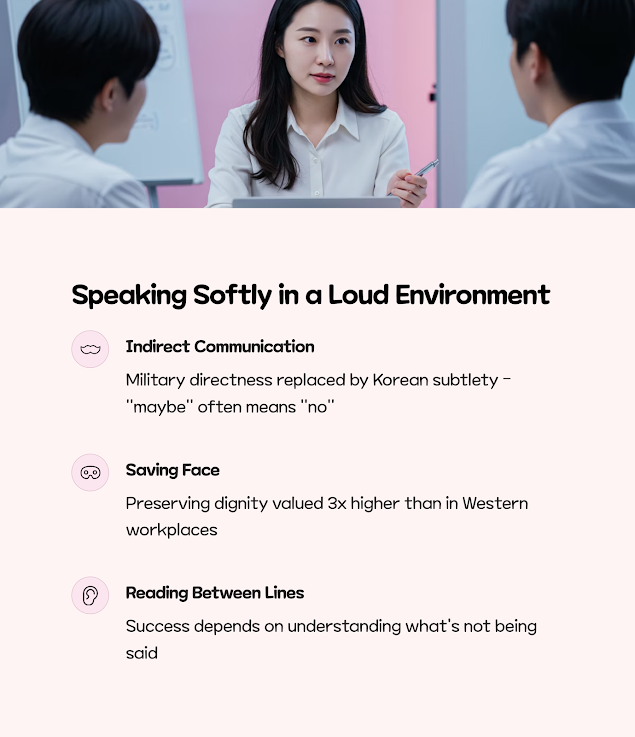From direct orders to subtle bows, this veteran’s journey into Korean office life redefined everything I knew about work
Military to Office – A Shift Beyond Uniforms
Swapping combat boots for business casual seemed simple enough—until the culture set in.
The U.S. Army trained me for intensity, discipline, and clarity,
but corporate Korea offered a different battlefield: one of nuance, etiquette, and collective rhythm.
The biggest shock wasn’t what I did—but how I had to think and relate.
"Leaving the Army changed my role. Korea changed my perspective."
Respecting Rank, Korean-Style
I thought I knew hierarchy—until I met Korean office culture.
Job titles aren’t just formalities; they’re integral to every interaction.
Saying someone’s name without a title? Unthinkable.
Questioning your manager, even politely? Risky.
Instead, I learned to read rooms, bow on cue, and respect power dynamics that shaped not just decisions but even how coffee was poured.
"In Korea, rank is not just recognized—it’s ritualized."
The Unwritten Rule of “Hoesik”
Team building doesn’t end at 6 p.m.—it just moves to the restaurant.
Korean after-work dinners, or “hoesik,” were a revelation.
They weren’t optional. They were essential to earning trust and inclusion.
I mastered the etiquette: who pours for whom, when to drink, how to accept a shot with two hands.
Ironically, some of the most open conversations happened with soju, not slides.
"Skip hoesik, and you might just skip a promotion."
Speaking Softly in a Loud Environment
Military talk is bold and blunt. Korean communication? It’s a dance.
Criticism is implied. Complaints are softened. Disagreement may come wrapped in silence.
I had to unlearn directness and develop emotional radar—what was said mattered,
but what wasn’t said often meant more.
"Learning to hear the silence is part of speaking Korean."
Pace, Pressure, and the Art of Surviving “Ppalli-Ppalli”
Army tempo is tough. Korean office tempo is… faster.
The phrase “ppalli-ppalli” (hurry-hurry) is lived out daily—tight deadlines, fast replies, weekend emails.
Staying late was expected. Answering messages at 10 p.m.? Normal.
I had to find boundaries or lose balance.
"Korea didn’t break my discipline—it demanded I sharpen it."
Individualism vs. Group Harmony – A Leadership Reboot
In the Army, I was rewarded for standing out. In Korea, blending in became a strength.
Corporate success leaned on team consensus, not personal glory.
I learned to support from behind, defer when needed, and prioritize group mood over personal opinion.
Leadership wasn’t louder—it was quieter, steadier, and more relational.
"Respecting group rhythm taught me a new kind of strength."
Lessons I Took with Me – For Veterans Eyeing Korea
Every challenge in this transition held a lesson:
-
Adaptation is more than survival—it’s transformation.
-
Respect flows differently but just as deeply.
-
Humility opens doors faster than confidence.
To any veteran eyeing a career in Korea: be curious, observe first, speak second.
The rewards? Eye-opening, career-shaping, unforgettable.
"This journey didn’t erase my military roots—it deepened them."








